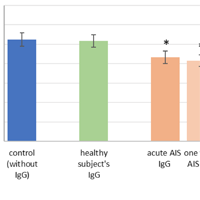Effects of IgG from the serum of ischemic stroke patients on hemostasis

Accepted: April 30, 2021
All claims expressed in this article are solely those of the authors and do not necessarily represent those of their affiliated organizations, or those of the publisher, the editors and the reviewers. Any product that may be evaluated in this article or claim that may be made by its manufacturer is not guaranteed or endorsed by the publisher.
Ischemic stroke is among the top diseases leading to mortality and disability in the world. The detailed investigation of the mechanisms underlying this pathology and especially mediating the tendency to relapse during the first year after stroke incident undoubtedly belongs to important tasks of modern medicine and biology. The current study aims to analyze the influence of IgG derived from the blood serum of ischemic stroke patients on some hemostasis factors. In total, 123 participants with IS, 62 with atherothrombotic ischemic stroke, 61 with cardioembolic ischemic stroke, and 57 subjects as control have been examined. The same patients have participated in the research a year after stroke. IgG from serum was isolated by affinity chromatography on protein A Sepharose column. The activity of key hemostasis factors under the influence of IgG was analyzed. Obtained results revealed that IgG of stroke patients but not healthy subjects caused the inhibition of the amidolytic activity of endogenously generated thrombin, protein C, factor Xa, and led to an increase in the degree of ADP-induced platelet aggregation. The reduction of clotting time in the test "Thrombin time" by IgG of patients at the acute phase of disease was also observed; IgG of healthy subjects mediated the opposite effect. In contrast to acute ischemic stroke IgG, IgG of patients one year after both atherothrombotic and cardioembolic ischemic stroke influenced only the activity of endogenously generated thrombin and factor Xa resulting in inhibition of their activities. It was also established that IgG of ischemic stroke patients, as well as healthy subjects, stimulated the secretion of tissue plasminogen activator by endotheliocytes.
Bejot Y, Bailly H, Durier J, Giroud M. Epidemiology of stroke in Europe and trends for the 21st century. Presse Med 2016;45:e391–e8. DOI: https://doi.org/10.1016/j.lpm.2016.10.003
Khoshnam SE, Winlow W, Farzaneh M, et al. Pathogenic mechanisms following ischemic stroke. Neurol Sci 2017;38:1167-86. DOI: https://doi.org/10.1007/s10072-017-2938-1
Doyle KP, Simon RP, Stenzel-Poore MP. Mechanisms of ischemic brain damage. Neuropharm 2008;55:310-18. DOI: https://doi.org/10.1016/j.neuropharm.2008.01.005
Badimon L, Padró T, Vilahur G. Atherosclerosis, platelets and thrombosis in acute ischaemic heart disease. Eur Heart J Acute Cardiovasc Care 2012;1:60–74. DOI: https://doi.org/10.1177/2048872612441582
Katrii TB, Shandyuk VYu, Vovk TB, et al. Effect of IgG from multiple sclerosis patients on amidolytic activity of coagulation and anticoagulation factors of hemostasis. Biomed Res Ther 2017;7.4:1502-512. DOI: https://doi.org/10.15419/bmrat.v4i08.205
Katrii T, Vovk T, Kravchenko N, et al. Influence of IgG separated from blood plasma of patients with ischemic stroke on the process platelet's proteins secretion. Int J Chem Biomol Sci 2015;278-83.
Staube HL, Norman GL, Crowther T, et al. Antibodies to the atherosclerotic plaque components beta2-glycoprotein i and heatshock proteins as risk factors for acute cerebral ischemia. Arq Neuropsiquiatr 2003;61:757-63. DOI: https://doi.org/10.1590/S0004-282X2003000500010
Katsarou E, Attilakos A, Fessatou S, et al. Anti-beta2-glycoprotein I antibodies and ischemic stroke in a 20-month-old boy. Pediatrics 2003;112:188-90. DOI: https://doi.org/10.1542/peds.112.1.188
Grodzki AC, Berenstein E. Antibody purification: affinity chromatography - protein A and protein G Sepharose. Meth Mol Biol 2010;588:33-41. DOI: https://doi.org/10.1007/978-1-59745-324-0_5
Tsoupras A, Ioannis Zabetakis I, Lordan R. Platelet aggregometry assay for evaluating the effects of platelet agonists and antiplatelet compounds on platelet function in vitro. Meth X 2019;6:63–70. DOI: https://doi.org/10.1016/j.mex.2018.12.012
Gubar OS, Rodnichenko AE, Zlatskaya AV, et al. Isolation and large-scale cultivation of endothelial progenitor cells from peripheral blood. Probl Cryobiol Cryomed 2018;28:29-33. DOI: https://doi.org/10.15407/cryo28.01.029
Davis M, Mantle D, Mendelow AD. The role of proteolytic enzymes in focal ischaemic brain damage. Acta Neurochir Suppl 2000;76:261-4. DOI: https://doi.org/10.1007/978-3-7091-6346-7_53
Iadecola C, Anrather J. The immunology of stroke: from mechanisms to translation. Nat Med 2011;17:796–808. DOI: https://doi.org/10.1038/nm.2399
Soare AM, Popa C. Deficiencies of Proteins C, S and Antithrombin and Activated Protein C Resistance–Their Involvement in the Occurrence of Arterial Thromboses. J Med Life 2010;3:412–15.
Majid Z, Tahir F, Ahmed J, et al. Protein C deficiency as a risk factor for stroke in young adults: a review. Cureus 2020;12:e7472. DOI: https://doi.org/10.7759/cureus.7472
Dahlbäck B, Villoutreix B. Regulation of blood coagulation by the protein C anticoagulant pathway. Novel insights into structure-function relationships and molecular recognition. Arterioscl Thromb Vasc Biol 2005;25:1311–320. DOI: https://doi.org/10.1161/01.ATV.0000168421.13467.82
Rosafio F, Lelli N, Mimmi S, et al. Platelet Function Testing in Patients with Acute Ischemic Stroke: An Observational Study. J Stroke Cerebr Dis 2017;26:1864-73 DOI: https://doi.org/10.1016/j.jstrokecerebrovasdis.2017.04.023
PAGEPress has chosen to apply the Creative Commons Attribution NonCommercial 4.0 International License (CC BY-NC 4.0) to all manuscripts to be published.


 https://doi.org/10.4081/jbr.2021.9582
https://doi.org/10.4081/jbr.2021.9582



